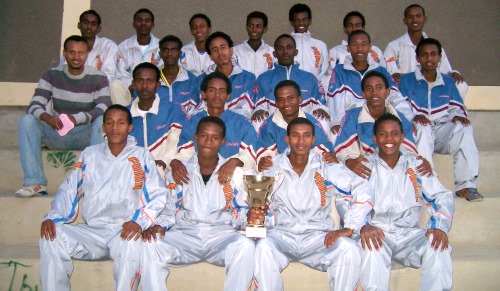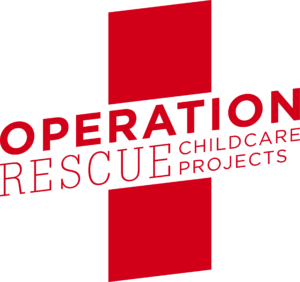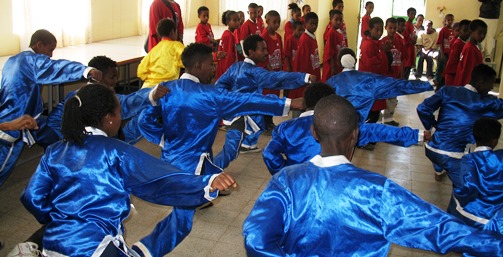Our children live as far as possible with their own family. They attend the local school in the morning and the second half of the day we take care of them from Monday to Friday in our day care centre. Our work aims at children at kindergarten and school age. We offer them an attractive after school program which prevents them spending their free time on the streets. We want to provide the children through targeted support with a better life now and in the future. Our after school program in the day care centre includes the following:
Sports and leisure activities

Besides teaching, the children have plenty of time for leisure activities – for simply just being children, which is sometimes quite difficult for them outside our facilities. Some of the possibilities:
Sports and recreation
Most of the children live in areas where there are no places to play. Staff at the centre have constructed play facilities for the children and they and the sports facilities are widely used. Children can participate in both indoor and outdoor sports and teams are formed according to the children’s ages and their sports interests.
Creativity
Children can engage in drawing and painting, pottery, drama, sewing, dancing and gymnastics. These activities are enjoyed especially during the months of July and August when schools are closed but the centre remains open.
Swimming Pool
This facility is enjoyed greatly by the children when the availability of water and the weather permit.
Educational activities
 The project provides tutorial classes from Grades 1-12 for the academically weak children to help them make progress at school working on the system that the children go to school for half a day and the centre for the other half day. However present Government policy which encourages schools to keep pupils for the full day has had an impact upon this provision. There is also a place where they can have supervision and support as they do homework and additional work as for most children there are no such facilities at home.
The project provides tutorial classes from Grades 1-12 for the academically weak children to help them make progress at school working on the system that the children go to school for half a day and the centre for the other half day. However present Government policy which encourages schools to keep pupils for the full day has had an impact upon this provision. There is also a place where they can have supervision and support as they do homework and additional work as for most children there are no such facilities at home.
The children have access to a library where there is a member of staff to give them advice and support.There is also a computer room with a trained member of staff who was once a student in the project.
Operation Rescue communicates with the school. Every child has a Report Card that is written by the teachers of the children each half year.
Every 3 months a member of the staff of Operation Rescue visits the school of each child to get to know the child’s progress and communicate with their teachers. Together they summarize if there was progress or not. If not, they try to figure out why and to construct a plan. For every child there is information on the database including all necessary educational information.
Teachers, volunteers or employees assist and support particular children and teenagers with difficulties in school. They have to attend at special times and they do their homework with them. The teachers constantly check if there is a lack of school supplies.
At the start of each session in the centre, in the morning and in the afternoon, the children at the centre gather to hear stories from the Bible as well as to receive general moral and ethical teaching.
From time to time there are opportunities to hire transport and to take the children on recreational and educational trips both within and beyond Mekelle.
Nutrition
 Everyday from Monday to Friday the children receive a hot meal at lunch time.
Everyday from Monday to Friday the children receive a hot meal at lunch time.
This is vitally important as for most children this is the only meal they will have in the day. The menu for the meals includes fruit and vegetables, meat and pulses so that it is a balanced nutritious meal. Professionals supervise and prepare the food for the pupils.
Health (clinic) and hygiene
 The centre has a health centre which is officially registered and staffed by a professional nurse. He monitors the general health of the children and as required, medicine and treatment is provided free of charge. The families of the children also have access to these facilities. Where it is necessary for a child to stay in hospital and receive treatment and medicine the project covers all of these costs. Even if the children are at school all day they can come to the health centre if they have any health problems. When possible checkups are done by volunteer doctors. This annual check-up includes psychological and neurological tests, eye testing and dental care. The results of the consultation are recorded in the project database.
The centre has a health centre which is officially registered and staffed by a professional nurse. He monitors the general health of the children and as required, medicine and treatment is provided free of charge. The families of the children also have access to these facilities. Where it is necessary for a child to stay in hospital and receive treatment and medicine the project covers all of these costs. Even if the children are at school all day they can come to the health centre if they have any health problems. When possible checkups are done by volunteer doctors. This annual check-up includes psychological and neurological tests, eye testing and dental care. The results of the consultation are recorded in the project database.
Every child under 5 is scheduled for vaccination. Since the project cares also for HIV positive children, checkups are made monthly on those children to ensure their well being and use of proper medicines. The government provides the medicine to care for the HIV positive children. The standard of hygiene of the children is constantly monitored. The state of hair, finger nails etc. is checked as is the state of the children’s clothing and shoes. Showers are available at the centre and there are facilities for the washing of children’s clothes where this is necessary.
Computer science for children with and without disabilities
Our computer science lab with 20 workstations is an important part of our centre. The children learn to deal with computers and the internet in order to be able to use them for their education. In addition to the computer science area, the centre also has a room for our 60 blind students which we support and where they can access software that provides learning materials for them. With the support of a different organization Operation Rescue was able to develop some work for the blind, as part of that, books are for example recorded on phonograms. And it goes on: Recently we have received financial aid, so similar jobs for students with other disabilities such as hearing or mobility difficulties can be created.
Family outreach and social work
Whenever possible, the children live with their parents or some relatives. Families are visited once a month by the social worker at the centre in order to provide guidance and advice for children and their carers. He/she reports back if families have special difficulties and for example money can be given for house rent to families in especially poor circumstances.
The children are guided in their education, health, social conduct to learn responsibility and accountability, and to respect their rights and obligations, in order to become productive members of society. To the maximum degree, the children are challenged to face a “normal” daily life and take responsibility for their own environment.
It is one of the main principles of ORE, that the families are involved in the project. The day care centre is not meant to be a substitute for the family merely a support for the child and his whole environment. Families who are in need are provided with basic food supplies and interested mothers receive training and support so that they can as far as possible feed their family and themselves. For this purpose, we equipped for example a room with several spinning wheels where women are taught to spin wool.
Prevention and security
An important tool of our work is prevention. Thanks to the intensive work of our devoted staff the organisation will receive its greatest reward in the future: to see how life changes for the participating children to become a life of dignity, without violence, drugs and hopelessness and to see how the children avoid dangers along the way and and how they become productive members of society! Our centre provides protection and security. The day care centre and the family houses are surrounded by walls. We act in emergency situations and contact immediately the police or the social services in cases of suspected child abuse. Sometimes the parents turn to us when their children are forced by drug dealers to work for them. So we are already able to protect many children.
Operation Rescue


